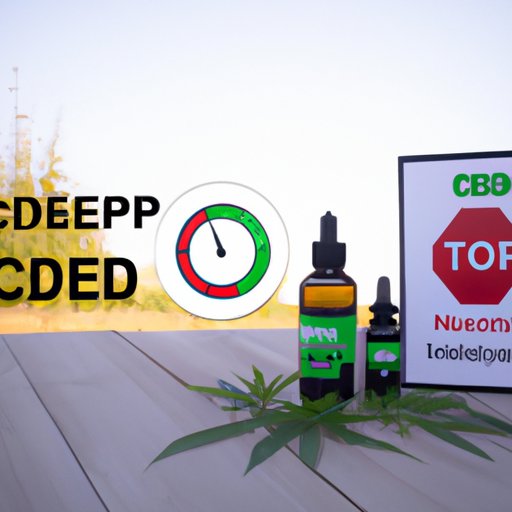Introduction
Many people struggle with managing their appetite, whether it’s dealing with food cravings, overeating, or simply not feeling hungry. These issues can impact not only our physical health but also our mental well-being and quality of life. As a result, there’s always been a demand for effective solutions to help control our appetite. One potential solution that’s gained popularity in recent years is the use of CBD oil.
CBD is a compound derived from the cannabis plant, known to have various health benefits such as pain relief, anxiety management, and improving sleep quality. While studies have shown that CBD can help with a wide range of health issues, its effects on appetite control are still being researched.
In this article, we’ll explore the science behind CBD and appetite, evaluate personal testimonies of using CBD for appetite control, and analyze the potential benefits and drawbacks of using CBD oil for weight loss and other purposes.

Researching the Science Behind CBD and Appetite
Research on the effects of CBD on appetite is still early and somewhat limited. However, scientists have discovered several potential mechanisms by which CBD could impact appetite.
One way CBD might affect appetite is by interacting with CB1 and CB2 receptors in the brain and body. These receptors play a key role in regulating appetite, and CBD appears to modulate their activity, potentially suppressing or increasing appetite depending on the dosage taken.
Another way CBD might affect appetite is by impacting hormones related to hunger and satiety, such as ghrelin and leptin. These hormones are released by the digestive system and signal our brain whether we’ve had enough to eat or not. CBD might be able to help regulate these hormones, leading to changes in appetite.
One research study found that CBD administration in rats reduced food intake and body weight gain. However, the long-term effects of CBD on eating behavior and metabolism are not yet confirmed.

Exploring the Connection Between CBD and Weight Loss
A small number of studies suggest that CBD could have weight loss benefits by suppressing appetite. One study published in the Molecular and Cellular Biochemistry Journal found that CBD could help convert white fat to brown fat, which is thought to reduce weight gain.
However, other studies suggest that the weight loss benefits of CBD may not be directly linked to appetite suppression. Some researchers believe that the reduction in anxiety and improved sleep quality that’s often associated with CBD use could lead to weight loss by lowering cortisol levels and stabilizing the metabolism.
Regardless, it must be noted that CBD alone cannot guarantee weight loss and should not be considered a replacement for proper diet and exercise regimes.
Personal Testimony Regarding the Use of CBD for Appetite Control
Personal testimonies regarding the use of CBD for suppressing appetite have become more prevalent in recent times. People who have tried CBD for appetite control have reported mixed results.
One person found that taking CBD before meals helped them feel fuller faster and more satisfied after eating, leading to an overall reduction in appetite. However, some other individuals have reported no noticeable difference in their eating behavior, even after trying various methods of CBD consumption like tinctures, vaping, and edibles.
It’s important to note that personal experiences vary from individual to individual, and further research is needed to understand why CBD might work for some people and not for others.
How CBD Affects Our Hunger Hormones
CBD, as mentioned previously, interacts with hormones such as ghrelin and leptin, which are crucial in regulating appetite. By modulating these hormones, CBD might influence which signals reach our brains and how they’re interpreted.
Some research suggests that CBD can increase the production of leptin, which can suppress appetite and eventually aid in weight loss. However, this is yet to be fully researched and confirmed.
On the flip side, CBD might impact the production of ghrelin, which increases appetite. CBD could disrupt ghrelin production, leading to moderated appetite. However, this can lead to a reduction in the body’s natural hunger response, which can negatively impact overall health down the line.

The Effect of Cannabinoids on Metabolism
CBD, along with other cannabinoids, can impact the metabolism of the body’s fat cells by increasing the number of mitochondria in them. Mitochondria play an important role in converting food into energy.
Some research studies found that CBD can reduce the accumulation of fat in the body and increase the rate at which calories are burned. These factors can result in overall weight loss. Although these studies were conducted on animals, the results were promising.
It’s worth noting that using CBD alone and depending solely on it for weight loss can potentially cause more harm than good, as it should be paired with exercises and a balanced diet.

CBD Oil as an Alternative to Traditional Diet and Exercise
CBD oil has unique properties that make it an attractive alternative to traditional methods of appetite control, particularly for individuals who have difficulty strictly following diet and exercise regimes. It can be a useful tool for people who want to manage their appetite without resorting to more conventional weight-loss methods.
CBD oil is easy to use, and its subtle effects can be felt in a short amount of time. It’s also an appealing option for individuals who don’t want to consume anything artificial or are cutting back on sugar intake.
However, it should not be considered an adequate replacement for a nutritious and well-balanced diet, daily exercise, and other healthy lifestyle choices that regulate appetite.
The Pros and Cons of Using CBD Oil for Appetite
While CBD oil is a promising tool for managing appetite and weight loss, it’s not without its drawbacks. Here are some of the essential pros and cons to consider:
Pros:
– CBD oil is a natural remedy and easily accessible
– It can benefit a myriad of other health concerns besides appetite control
– Has been shown to assist with weight loss even without appetite suppression
– Can help users feel more satisfied with smaller portions and fewer calories
Cons:
– The effects of CBD on appetite control are still being studied and require further research
– Should not be relied upon to achieve significant weight loss goals
– Side effects such as dry mouth, dizziness, and changes in blood pressure are associated with CBD use.
– Could interact with other medications in use.
Conclusion
CBD oil has shown promise in regulating appetite and aiding in weight loss. However, it is crucial to stress that CBD alone is not a sole solution to these issues. As research continues on how CBD affects appetite, it’s important to acknowledge that individual results may vary. CBD oil is a promising tool to manage and regulate appetite when used in conjunction with exercise, a balanced diet, sleep and other healthy lifestyle habits. If you’re interested in trying CBD for appetite control, always consult with a doctor before starting.
